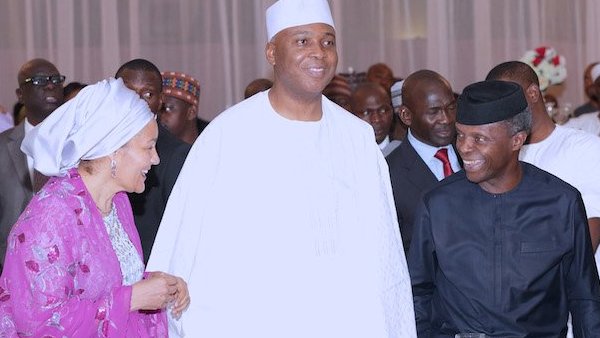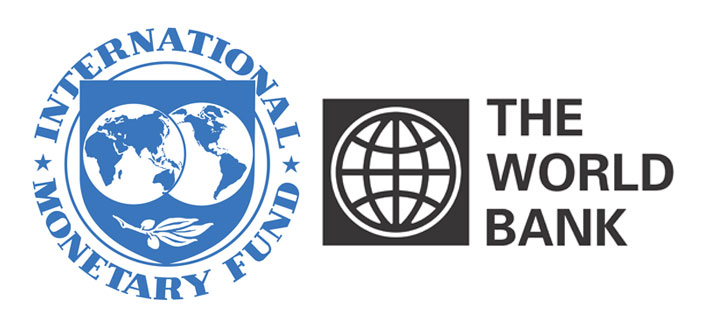…Says FG, CBN not sincere about strengthening the Naira
Renowned economist and founder, Allied Technol Systems Limited, Henry Boyo, has found the World Bank and its sister organization, the International Monetary Fund, IMF, culpable in respect of Nigeria’s economic woes.
Without mincing words, he names the Bretton Woods institutions guilty for their actions and inactions leading to the tragic devaluation of the Naira, forex and interest rates and consequent fall in living standard.
And his verdict on the local leadership is no better. Boyo notes that the Federal Government and Central Bank of Nigeria, CBN, are not sincere about restoring the value of the Naira against major currencies around the world.
Boyo, who has been championing the clamour for a stronger Naira for over 15 years, said the policies of the government toward the Naira over time have always been to weaken it and not to strengthen it as the government and CBN have often claimed.
In an exclusive interview with TheNewsGuru.com, the financial expert who spoke on the sidelines of the remarks and apparent ill advice the Federal Government has been receiving from the World Bank and IMF and subsequent effect on the economy and Naira in particular said:
“The IMF and World Bank cannot be in denial of the true cause of Nigeria’s economic woes. I mean I can’t possibly be richer in data base than both world renowned financial bodies. For example, as we speak, the CBN has about $30-31 billion in its reserves and we are told that the presidency wants a loan approval of 500 million Euros and the IMF and World Bank told our leaders not to look in the way of the CBN reserve but to start making immediate borrowing plans from that same bank the CBN is also keeping its reserves. So can you see how much we are being taken for a ride in this country?
“As part of efforts to find a long lasting solution to our economic crisis, it got to a stage that a close friend of mine and I wrote to the IMF stating some of the obvious challenges and seeking ways by which they can intervene to help fix it. After about a month of waiting, we got a response from IMF stating that they don’t have powers to challenge domestic policies but can only offer advisory roles,” he said.
The urbane financial critic also remarked that there was no true intention to restore the Naira to its glorious days. He noted that much of the economic mismatch of the incumbent and past administrations has further worsened the value of the Naira than they met it.
“The bottom line of it all is it that we need to understand and accept the fact that there is no true intention to see a stronger Naira. You don’t even have to have a school certificate to know that it does not make any sense to say that you are auctioning rations of dollars continuously in a market that you have suffocated with same Naira. That paradigm alone is meant to destroy the Naira.
“This is because anything you auction in ration in a market that you know that money used to buy the ration is already too much in that same market, not just because somebody said the money is too much, but you also admitted to because of the continuous mopping exercise that you embark on from time to time.
“You can ask, why do we say there is too much money when we can’t see it, unemployment rate is high and the entire country is in a near comatose? More so, how can something that is so surplus become overtly expensive?
“The reason is because the CBN that has the mandate to ensure that inflation is kept at a single digit (2/3 percent at the maximum) is busy restraining the amount of too much money that is in the system, which is why the naira remains unnecessarily expensive
“A market woman who doesn’t have any academic qualification whatsoever won’t commit such expensive blunder. So it’s not a matter of these people being bereft of ideas or knowledge but a deliberate attempt to make sure the Naira will never be stronger. Otherwise, why is no one asking any question that how come the Naira never appreciates even when our reserve doubled?” the seasoned economist queried.
He averred that the apex bank’s unfavourable policy towards the Naira is responsible for the current 17.26 per cent inflation rate in the country. “Once you start printing money in excess of productivity, what you get in return is called inflation,” Boyo explained.
TheNewsGuru.com reports that the National Bureau of Statistics, NBS in its Consumer Price Index, CPI report noted that inflation rate reduced from 18.72 per cent in January to 17.78 per cent in February. By March, it further went down to 17.26 per cent. However, the inflationary figure for April has yet to be released by the bureau.
Speaking on the side effect of high inflation, Boyo explained: “Inflation is a ravager, destroyer, an enemy of government and the people. If inflation, which is undeniably instigated by the fact that there is too much money in the system, is left unrestrained, you find out that the social values will also collapse.
“Inflation therefore is the very delicate baby of any administration or government. If it’s not well handled, it can ruin the nation. There’s no diversification, intervention, policies or budget that can stop its ravaging effect on the economy. So you have to be afraid of letting inflation go out of control”.
The seasoned expert explained that there is no amount of budget or government’s special intervention (under whatever disguise) that can save the ravaging effects of high inflation on the economy and the people. “In fact, any hope that your budget will rescue you is a foolish hope,” he said.
According to the economist, inflation is caused by excessive money in circulation and it will be said to have gone above limits in responsive and successful economies all over the world when it’s above 3 – 4 percent. He said the higher the inflation, the lesser the value of the currency.
“In responsive and successful economies all over the world, the rate of inflation will be adjudged to have gone haywire when it is above 3 or 4 per cent for the same reason because it is believed that if inflation is trending at 20 per cent, for example, if you are going to be retired in 5 years and you are depending on your pension, you are gone because within these 5 years if inflation grows again by 3 per cent, then what are you going to fall back on? Because by then what you would be paid as pension will be peanuts and it might be so bad that you have to get something else doing even in retirement to supplement the poor pay. So in this scenario if someone brings an illegal deal to you, you will gladly accept it, thereby causing a gradual breakdown of our social values and the circle goes on that way,”Boyo explained.
Boyo also queried the media for ‘celebrating’ without asking where some of the policies of the government will land the nation in the long run.
“You really don’t have to be a student of economics before noticing all this, obvious managerial recklessness that they throw in our faces all the time. It’s high time the media started asking questions that will make the policy managers know that we all can’t be fooled at the same time. The praise singing by the media must stop. We deserve better deal as Nigerians,” he said.
Watch out for full interview…



